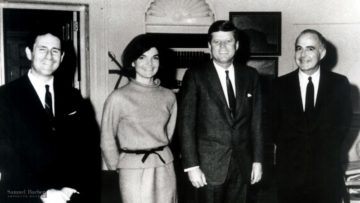by Thomas Larson

If we include in an overview of JFK’s classical musical legacy, those compositional masterpieces that honored him after his death, two pieces jump out of the field for me: Leonard Bernstein’s Mass and Samuel Barber’s Adagio for Strings.
Mass was commissioned by his wife, Jackie, to open the John F. Kennedy Center for the Performing Arts in 1971. Bernstein used the venue’s function—performance—literally: he stitched together a transmedial work that combined the best of Brahms’ German Requiem, The Who’s Tommy, and his own Candide.
Mass’s subtitle was “a theater piece for singers, players, and dancers.” It featured a rock band within a full orchestra, forty blues, rock, and light opera singers, two choirs, dancers, strolling musicians, and tape sounds produced quadrophonically. Among its highlights for me was Bernstein’s pairing an irreligious element with a Bible-based piety, especially in the gospel/sermon “God Said.” One wasn’t sure how much this jagged little tune embraced the tradition of preaching the Holy Fire or made a parody of it. Most memorable are the choral lines: “And it was good, brother / And it was good, brother / And it was good, brother / And it was goddam good.”
The work is like a top, spinning madly, gyrating and tilting, ready to fall, only to be re-spun by Bernstein’s gift of musical invention—his theatrical blood pumping his multiple moods, which range from meditative to melancholic to bossy to sardonic to unabashedly poppy and sentimental, equally unafraid of the raw and the honest.
As to JFK’s Bernstein-interrupted legacy, Mass embodies the existential tension the Dallas assassination left Americans with in the 1960s and beyond. Just then America was beginning its post-Christian rebirth, its full floundering in Vietnam, its fearful grip on the New Age, its exasperation with Richard Nixon’s trickery (echoing down the halls of Congress today with Trump), its epochal shift from the protests of the Sixties to the dismantling of artistic institutions (the end of serialism, Thank God), which arrived in the Seventies. And it was goddam good.
The music program Jackie chose for the Monday evening classical-music tribute to her slain husband—the date, Monday, November 25, 1963; the players, the National Symphony Orchestra; the place, an empty hall in Washington D.C.—included, as Mrs. Kennedy later said, one of her husband’s favorite pieces, the Adagio for Strings by Samuel Barber.
The idea was a concert of music JFK loved for a radio audience who heard no applause after each work, an anomaly except in programs that honor and grieve the dead, and, thus, give the country a means for supplication, perhaps expiation, upon the loss of its widely beloved president.
The Adagio was one of Kennedy’s favorites because he remembered where he was when it was played on the radio, April 12, 1945, immediately following the announcement of President Franklin Roosevelt’s sudden death. Kennedy remembered where he was and what he had heard that day: the continual playing of Barber’s work on the national networks solidified the Adagio as the music Americans turn to when we face national tragedies—presidential deaths and terrorist attacks like 9/11.
In closing, there is a haunting photograph taken a week before Kennedy was killed of Jackie, John, Samuel Barber, and Gian Carlo Menotti, Barber’s on-again/off-again life partner. They are standing side by side, in the White House, the presidential couple in the middle, Menotti on the right, Barber on the left. All are smiling, perhaps cameraman finagled. Jackie and Barber hold their hands behind their backs, suggesting introverted and melancholic natures. Menotti and JFK show expressive hands, revealing extroverted and lusty selves.
Most clear, however, is their independent personalities. Perhaps it’s a projection on my part (what else are photographs for, I wonder), but I see each at the most vulnerable high-point of their lives: Jackie and John, in their third year, who are cruising to an easy reelection, though, they cannot know Lee Harvey Oswald is stalking them; Menotti, the arch-dramatic opera composer, whose serial unfaithfulness will lead to a breakup with Barber; and Barber having just won his second Pulitzer Prize for his Piano Concerto, who is working on his opera, Anthony and Cleopatra, which will fail in three years at its Met premiere.
This bright November day—when all trespass seemed walled off and two American composers whose music Jackie and John adored came to call—still held the Camelot mystique of the past, the ever-disappearing present, and the train-rushing derailment of the future, that span of symphonic space across which these four legends sound the era.
